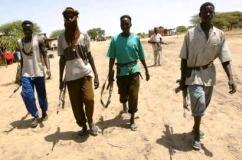UN warns that Darfur could descend into anarchy with warlords
By EDITH M. LEDERER, Associated Press Writer
UNITED NATIONS, Nov 4, 2004 (AP) — The top U.N. envoy to Sudan warned the Security Council Thursday that Darfur could easily descend into anarchy with warlords in control unless African Union troops deploy quickly and peace negotiations speed up.

|
|
Members of Sudan Liberation Army walk with their rifles at Ashma village 30 km (19 miles) from Nyala, south Darfur, October 6, 2004. (Reuters). |
Jan Pronk said the 20-month conflict in the vast western region is changing, with the government not in control of its own forces and a leadership crisis within the rebel movements. He accused both sides of violating an April cease-fire agreement and seeking more territory in Darfur, which is about the size of France.
While there was slow progress on the political front in October, Pronk said, violence and insecurity increased and in recent days “the situation deteriorated and tension rose to a level unprecedented since early August.”
“Fighting is breaking out in more and more places. Parties are provoking one another. Militias are ganging up. Governmental authorities are not able to exert a moderating influence, or they respond with untimely and even counter-productive measures,” he said.
“If this negative trend is not reversed it is a recipe for disaster,” Pronk warned. “If the fighting continues crops will fail. Then the whole population of Darfur will become dependent on humanitarian assistance.”
The United Nations has called Darfur the world’s worst humanitarian crisis, saying the conflict there has claimed 70,000 lives since March — mostly from disease and hunger.
Violence started after two non-Arab rebel groups launched attacks in March 2003. Originally a clash between black African farmers and Arab nomads over the distribution of scarce resources, the conflict has grown into a counterinsurgency in which pro-government Arab militia have raped and killed people and burned villages.
According to a monthly report from Pronk, which was sent to the council Wednesday by Secretary-General Kofi Annan, the estimate of people affected by the conflict rose during September from 1.8 million to 2 million and is expected to continue climbing in the months to come because of growing insecurity.
The increase stems mainly from the growing number of people who have fled their homes, now 1.6 million, the report said. A further 400,000 people are in need of humanitarian assistance.
“Darfur may easily enter a state of anarchy; a total collapse of law and order,” Pronk warned. “The border lines between the military, the paramilitary and the police are being blurred.”
“Within the rebel movements, there is a leadership crisis. There are splits. Some commanders provoke their adversaries by stealing, hijacking and killing, some seem to have begun acting for their own private gain,” he said.
Pronk warned that “we may soon find Darfur is ruled by warlords” unless rebel commanders start taking responsibility for civilians in their areas.
The U.N. envoy said the possibility of “survival of the fittest and death for the weakest” can only be reversed by a three-pronged approach.
Official and self-selected political leaders must be held accountable “for ongoing violations of agreements and further human misery,” he said, and armed groups must be told that their rebel status “does not exonerate them from a moral obligation towards their people.”
The expanded African Union force must deploy rapidly to “effectively deter violations,” Pronk said, urging the Security Council to consider new ways to increase financial and logistical support to get troops where they’re needed most.
Political negotiations on Darfur and on ending the 21-year civil war between the government and rebels in southern Sudan also must be speeded up “to get a grip on the security situation on the ground,” he said.
The Security Council will be holding a rare meeting on Nov. 18-19 in Nairobi, Kenya, where talks to end the civil war are taking place. Pronk said it offered “an excellent opportunity” to promote robust negotiations.
On Darfur, he said, the council should press government and rebel negotiators in Nigeria to adopt a declaration of principles and a time frame and detailed agenda for political negotiations by the end of the year. The council should also press for completion of the final stage of north-south negotiations to end the civil war by the end of the year.
